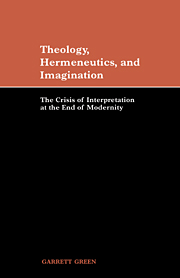Book contents
- Frontmatter
- Contents
- Preface
- 1 Theological hermeneutics in the twilight of modernity
- Part I The modern roots of suspicion
- 2 The scandal of positivity: the Kantian paradigm in modern theology
- 3 Against purism: Hamann's metacritique of Kant
- 4 Feuerbach: forgotten father of the hermeneutics of suspicion
- 5 Nietzschean suspicion and the Christian imagination
- Part II Christian imagination in a postmodern world
- Appendix: Hamann's letter to Kraus
- Bibliography
- Index
3 - Against purism: Hamann's metacritique of Kant
Published online by Cambridge University Press: 22 September 2009
- Frontmatter
- Contents
- Preface
- 1 Theological hermeneutics in the twilight of modernity
- Part I The modern roots of suspicion
- 2 The scandal of positivity: the Kantian paradigm in modern theology
- 3 Against purism: Hamann's metacritique of Kant
- 4 Feuerbach: forgotten father of the hermeneutics of suspicion
- 5 Nietzschean suspicion and the Christian imagination
- Part II Christian imagination in a postmodern world
- Appendix: Hamann's letter to Kraus
- Bibliography
- Index
Summary
… the heart beats before the head thinks.
Hamann… the proponents of competing paradigms practice their trades
in different worlds.
KuhnAfter beginning with a look at Ricoeur's notion of the hermeneutics of suspicion, and attempting to locate ourselves historically in what I am calling the “twilight of modernity,” we zeroed in on that watershed figure of modern thought, Immanuel Kant. His book Religion within the Limits of Reason Alone, one could argue, was the first book ever written on religion – that is, on religion as such, as distinct from the Christian or any other of the “positive religions.” Our analysis showed us that Kant does not after all simply leave Christianity behind in favor of a rationalized “natural religion”; rather, he seeks to convince us both of the necessity of what he calls “pure rational faith” and that it is best embodied historically in the Christian religion. To make his case, however, he must subject the Christian gospel to a kind of distillation or winnowing process, in order to separate out the pure kernel of rational faith from the husk of mere “positivity.” By so doing, Kant exemplifies a pattern that was to be emulated many times over the following two centuries, a pattern that I have dubbed “accommodationist theology”: the endeavor to present Christianity in a form acceptable to the enlightened sensibility of modern people by removing its offensive “positivity.” The accommodationist project, however, is fraught with difficulties that have become all too obvious since Kant wrote his book in the waning years of the German Enlightenment. Those difficulties will become more apparent as we follow the origins and development of the hermeneutics of suspicion in the course of the nineteenth century.
- Type
- Chapter
- Information
- Theology, Hermeneutics, and ImaginationThe Crisis of Interpretation at the End of Modernity, pp. 49 - 82Publisher: Cambridge University PressPrint publication year: 1999

